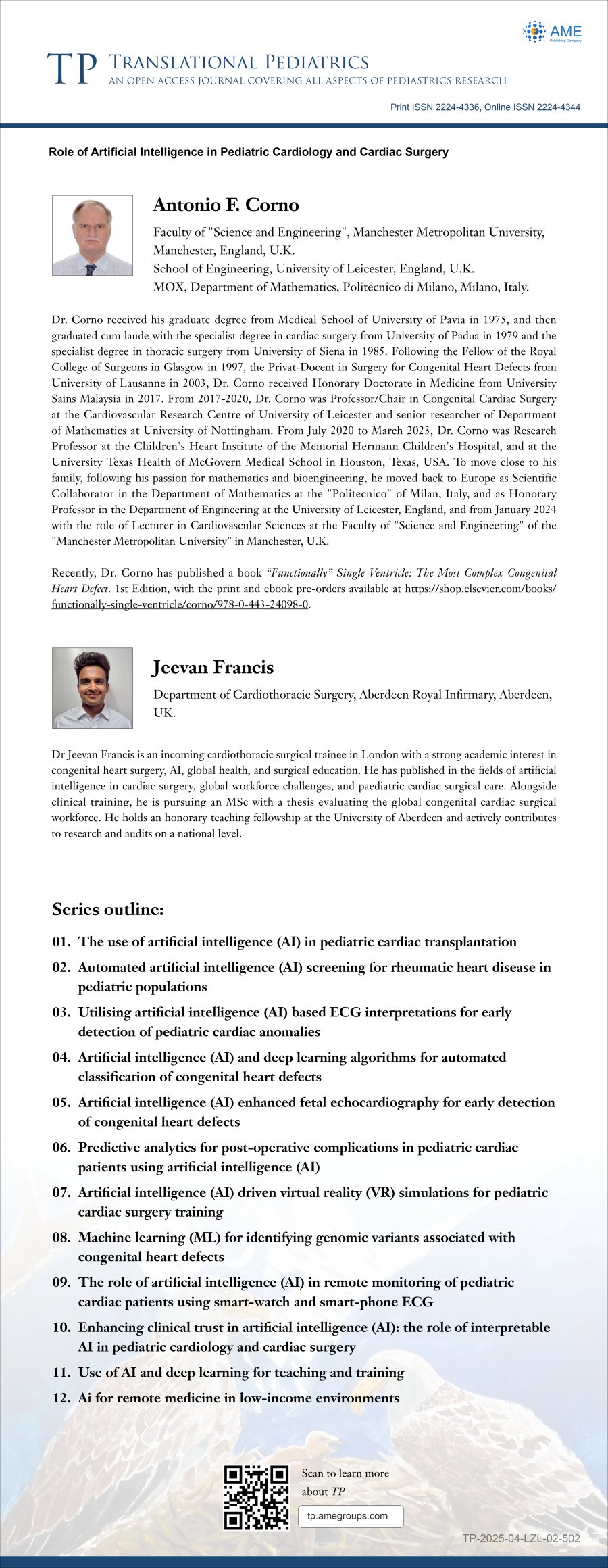
This series on "Role of Artificial Intelligence in Pediatric Cardiology and Cardiac Surgery" is edited by Dr. Antonio F. Corno from Manchester Metropolitan University, U.K., University of Leicester, U.K., and Politecnico di Milano, Italy, and Dr. Jeevan Francis from Aberdeen Royal Infirmary, UK.
Artificial Intelligence (AI) is reshaping the landscapes of modern medicine and surgery, providing remarkable opportunities to enhance our diagnostics capabilities, treatment strategies, and ultimately improve patient care. With its ability to analyze vast datasets, identify intricate patterns, and generate predictive insights, AI has revolutionized decision-making across numerous medical specialties. In pediatric cardiology and cardiac surgery, fields characterized by complex and variable conditions and need for precise interventions, AI offers immense potential to facilitate early diagnosis, optimize surgical planning, and improve early and long-term outcomes.
Translational Pediatrics is launching a special series titled "Artificial Intelligence in Pediatric Cardiology and Cardiac Surgery", aiming to explore the integration of AI into pediatric cardiac care, highlighting both its current applications and future potential. We welcome contributions investigating how AI can enhance diagnostics, optimize interventional and surgical planning, refine patient monitoring, and improve early and long-term outcomes.
Antonio F. Corno
Faculty of "Science and Engineering", Manchester Metropolitan University, Manchester, England, U.K.
School of Engineering, University of Leicester, England, U.K.
MOX, Department of Mathematics, Politecnico di Milano, Milano, Italy.
Dr. Corno received his graduate degree from Medical School of University of Pavia in 1975, and then graduated cum laude with the specialist degree in cardiac surgery from University of Padua in 1979 and the specialist degree in thoracic surgery from University of Siena in 1985. Following the Fellow of the Royal College of Surgeons in Glasgow in 1997, the Privat-Docent in Surgery for Congenital Heart Defects from University of Lausanne in 2003, Dr. Corno received Honorary Doctorate in Medicine from University Sains Malaysia in 2017. From 2017-2020, Dr. Corno was Professor/Chair in Congenital Cardiac Surgery at the Cardiovascular Research Centre of University of Leicester and senior researcher of Department of Mathematics at University of Nottingham. From July 2020 to March 2023, Dr. Corno was Research Professor at the Children's Heart Institute of the Memorial Hermann Children's Hospital, and at the University Texas Health of McGovern Medical School in Houston, Texas, USA. To move close to his family, following his passion for mathematics and bioengineering, he moved back to Europe as Scientific Collaborator in the Department of Mathematics at the "Politecnico" of Milan, Italy, and as Honorary Professor in the Department of Engineering at the University of Leicester, England, and from January 2024 with the role of Lecturer in Cardiovascular Sciences at the Faculty of "Science and Engineering" of the "Manchester Metropolitan University" in Manchester, U.K.
Recently, Dr. Corno has published a book "Functionally" Single Ventricle: The Most Complex Congenital Heart Defect. 1st Edition, with the print and ebook pre-orders available at https://shop.elsevier.com/books/functionally-single-ventricle/corno/978-0-443-24098-0.
Jeevan Francis
Department of Cardiothoracic Surgery, Aberdeen Royal Infirmary, Aberdeen, UK.
Dr Jeevan Francis is an incoming cardiothoracic surgical trainee in London with a strong academic interest in congenital heart surgery, AI, global health, and surgical education. He has published in the fields of artificial intelligence in cardiac surgery, global workforce challenges, and paediatric cardiac surgical care. Alongside clinical training, he is pursuing an MSc with a thesis evaluating the global congenital cardiac surgical workforce. He holds an honorary teaching fellowship at the University of Aberdeen and actively contributes to research and audits on a national level.
Series outline:
- The use of artificial intelligence (AI) in pediatric cardiac transplantation
- Automated artificial intelligence (AI) screening for rheumatic heart disease in pediatric populations
- Utilising artificial intelligence (AI) based ECG interpretations for early detection of pediatric cardiac anomalies
- Artificial intelligence (AI) and deep learning algorithms for automated classification of congenital heart defects
- Artificial intelligence (AI) enhanced fetal echocardiography for early detection of congenital heart defects
- Predictive analytics for post-operative complications in pediatric cardiac patients using artificial intelligence (AI)
- Artificial intelligence (AI) driven virtual reality (VR) simulations for pediatric cardiac surgery training
- Machine learning (ML) for identifying genomic variants associated with congenital heart defects
- The role of artificial intelligence (AI) in remote monitoring of pediatric cardiac patients using smart-watch and smart-phone ECG
- Enhancing clinical trust in artificial intelligence (AI): the role of interpretable AI in pediatric cardiology and cardiac surgery
- Use of AI and deep learning for teaching and training
- Ai for remote medicine in low-income environments
Disclosure:
The series “Role of Artificial Intelligence in Pediatric Cardiology and Cardiac Surgery" is commissioned by the editorial office, Translational Pediatrics without any sponsorship or funding. Dr. Antonio F. Corno and Jeevan Francis are serving as the unpaid Guest Editor for the series.
